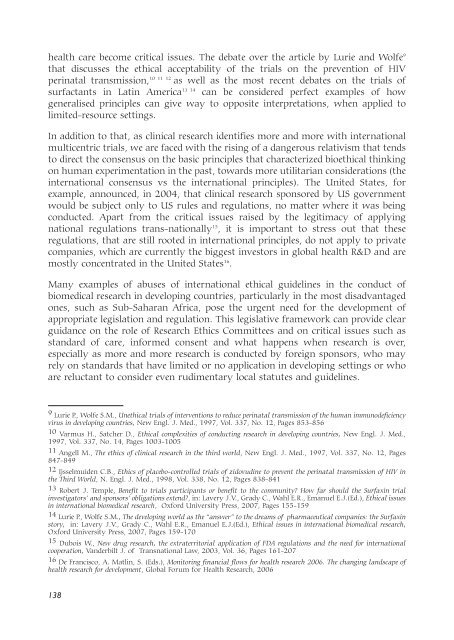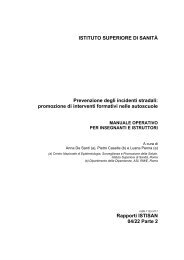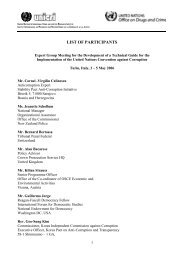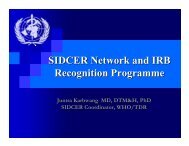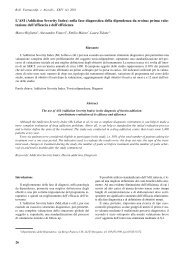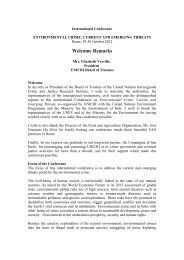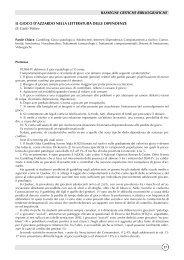Biomedical Research in Developing Countries - UNICRI
Biomedical Research in Developing Countries - UNICRI
Biomedical Research in Developing Countries - UNICRI
You also want an ePaper? Increase the reach of your titles
YUMPU automatically turns print PDFs into web optimized ePapers that Google loves.
health care become critical issues. The debate over the article by Lurie and Wolfe 9<br />
that discusses the ethical acceptability of the trials on the prevention of HIV<br />
per<strong>in</strong>atal transmission, 10 11 12 as well as the most recent debates on the trials of<br />
13 14<br />
surfactants <strong>in</strong> Lat<strong>in</strong> America can be considered perfect examples of how<br />
generalised pr<strong>in</strong>ciples can give way to opposite <strong>in</strong>terpretations, when applied to<br />
limited-resource sett<strong>in</strong>gs.<br />
In addition to that, as cl<strong>in</strong>ical research identifies more and more with <strong>in</strong>ternational<br />
multicentric trials, we are faced with the ris<strong>in</strong>g of a dangerous relativism that tends<br />
to direct the consensus on the basic pr<strong>in</strong>ciples that characterized bioethical th<strong>in</strong>k<strong>in</strong>g<br />
on human experimentation <strong>in</strong> the past, towards more utilitarian considerations (the<br />
<strong>in</strong>ternational consensus vs the <strong>in</strong>ternational pr<strong>in</strong>ciples). The United States, for<br />
example, announced, <strong>in</strong> 2004, that cl<strong>in</strong>ical research sponsored by US government<br />
would be subject only to US rules and regulations, no matter where it was be<strong>in</strong>g<br />
conducted. Apart from the critical issues raised by the legitimacy of apply<strong>in</strong>g<br />
national regulations trans-nationally 15 , it is important to stress out that these<br />
regulations, that are still rooted <strong>in</strong> <strong>in</strong>ternational pr<strong>in</strong>ciples, do not apply to private<br />
companies, which are currently the biggest <strong>in</strong>vestors <strong>in</strong> global health R&D and are<br />
mostly concentrated <strong>in</strong> the United States 16 .<br />
Many examples of abuses of <strong>in</strong>ternational ethical guidel<strong>in</strong>es <strong>in</strong> the conduct of<br />
biomedical research <strong>in</strong> develop<strong>in</strong>g countries, particularly <strong>in</strong> the most disadvantaged<br />
ones, such as Sub-Saharan Africa, pose the urgent need for the development of<br />
appropriate legislation and regulation. This legislative framework can provide clear<br />
guidance on the role of <strong>Research</strong> Ethics Committees and on critical issues such as<br />
standard of care, <strong>in</strong>formed consent and what happens when research is over,<br />
especially as more and more research is conducted by foreign sponsors, who may<br />
rely on standards that have limited or no application <strong>in</strong> develop<strong>in</strong>g sett<strong>in</strong>gs or who<br />
are reluctant to consider even rudimentary local statutes and guidel<strong>in</strong>es.<br />
9 Lurie P., Wolfe S.M., Unethical trials of <strong>in</strong>terventions to reduce per<strong>in</strong>atal transmission of the human immunodeficiency<br />
virus <strong>in</strong> develop<strong>in</strong>g countries, New Engl. J. Med., 1997, Vol. 337, No. 12, Pages 853-856<br />
10 Varmus H., Satcher D., Ethical complexities of conduct<strong>in</strong>g research <strong>in</strong> develop<strong>in</strong>g countries, New Engl. J. Med.,<br />
1997, Vol. 337, No. 14, Pages 1003-1005<br />
11 Angell M., The ethics of cl<strong>in</strong>ical research <strong>in</strong> the third world, New Engl. J. Med., 1997, Vol. 337, No. 12, Pages<br />
847-849<br />
12 Ijsselmuiden C.B., Ethics of placebo-controlled trials of zidovud<strong>in</strong>e to prevent the per<strong>in</strong>atal transmission of HIV <strong>in</strong><br />
the Third World, N. Engl. J. Med., 1998, Vol. 338, No. 12, Pages 838-841<br />
13 Robert J. Temple, Benefit to trials participants or benefit to the community? How far should the Surfax<strong>in</strong> trial<br />
<strong>in</strong>vestigators’ and sponsors’ obligations extend?, <strong>in</strong>: Lavery J.V., Grady C., Wahl E.R., Emanuel E.J.(Ed.), Ethical issues<br />
<strong>in</strong> <strong>in</strong>ternational biomedical research, Oxford University Press, 2007, Pages 155-159<br />
14 Lurie P., Wolfe S.M., The develop<strong>in</strong>g world as the “answer” to the dreams of pharmaceutical companies: the Surfax<strong>in</strong><br />
story, <strong>in</strong>: Lavery J.V., Grady C., Wahl E.R., Emanuel E.J.(Ed.), Ethical issues <strong>in</strong> <strong>in</strong>ternational biomedical research,<br />
Oxford University Press, 2007, Pages 159-170<br />
15 Dubois W., New drug research, the extraterritorial application of FDA regulations and the need for <strong>in</strong>ternational<br />
cooperation, Vanderbilt J. of Transnational Law, 2003, Vol. 36, Pages 161-207<br />
16 De Francisco, A. Matl<strong>in</strong>, S. (Eds.), Monitor<strong>in</strong>g f<strong>in</strong>ancial flows for health research 2006. The chang<strong>in</strong>g landscape of<br />
health research for development, Global Forum for Health <strong>Research</strong>, 2006<br />
138


